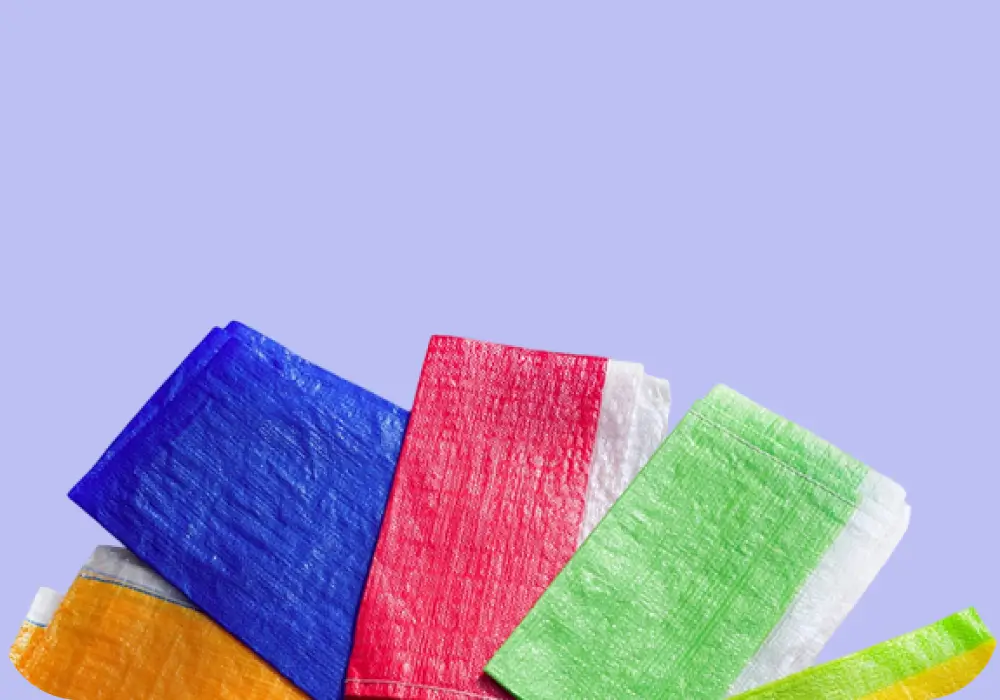
Wovensack Industries
Wovensack Industries at Dolphin Polyfill delivers high-performance masterbatches and additives engineered for woven fabrics, sacks, and packaging materials that demand durability, strength, and consistent quality. We offer a comprehensive product slate including White, Black, and Color Masterbatches, UV stabilisers, Optical Brighteners, PPA and Anti-oxidant Masterbatches; and Slip Masterbatches. Our applications cover a broad spectrum synthetic roofing underlayments, pond liners, tarpaulins and cross-laminated tarpaulins, container bags, fabric bags, geotextiles, and cement bags. Each product is designed to meet the specific performance needs of the end use—resistance to weather, tensile strength, flexibility, clarity, and cost-effectiveness. Backed by rigorous R&D, precise color matching, and proven polymer chemistry, Wovensack Industries ensures clients receive reliable, high-quality components that elevate the toughness, functionality, and aesthetic appeal of woven materials.

Application
-
Synthetic Roofing Underlayment
HDPE pipes (High-Density Polyethylene pipes) are plastic pipes made from HDPE material, known for their strength, flexibility, and resistance to corrosion and chemicals. They are widely used for:
- Water supply and distribution
- Sewage and drainage
- Gas distribution
- Irrigation systems
- Industrial applications
Key Features:
- Durable: Long service life (50+ years under normal conditions)
- Corrosion-resistant: Does not rust or corrode like metal pipes
- Flexible: Can bend without breaking, ideal for shifting soils or earthquakes
- Leak-proof: Heat-fused joints create a seamless system
- Lightweight: Easier to transport and install
HDPE pipes are a preferred choice in infrastructure projects due to their reliability and cost-effectiveness.
-
Pond Liners
Mulch film is a thin plastic sheet used in agriculture to cover the soil surface around plants. It helps improve crop yield and quality by modifying the soil environment.
Key Functions of Mulch Film:
- Weed control: Blocks sunlight to prevent weed growth
- Moisture retention: Reduces water evaporation from soil
- Soil temperature regulation: Warms the soil in cold seasons and stabilizes it overall
- Improved crop hygiene: Keeps fruits and vegetables cleaner by preventing soil contact
- Reduced soil erosion and compaction
Types of Mulch Films:
- Black mulch film: Best for weed control and heat absorption
- Silver/black film: Reflects light to repel insects
- Transparent mulch film: Promotes early growth but doesn’t suppress weeds well
- Biodegradable mulch film: Eco-friendly alternative that decomposes naturally
Mulch films are widely used in the cultivation of vegetables, fruits, flowers, and other commercial crops.
-
Tarpaulin / Cross Laminated Tarpaulin
A greenhouse is a structure made primarily of transparent materials like glass or plastic, designed to create a controlled environment for growing plants. It traps sunlight and heat inside, helping maintain an optimal climate for plant growth, regardless of external weather conditions.
Key Features of a Greenhouse:
- Temperature control: Retains warmth for plants in cold climates
- Humidity regulation: Helps maintain moisture levels in the air
- Protection: Shields crops from wind, rain, pests, and diseases
- Extended growing season: Allows cultivation before and after normal outdoor growing times
- Efficient use of water and nutrients: Through drip irrigation and fertigation systems
Commonly Grown in Greenhouses:
- Vegetables (tomatoes, capsicum, cucumbers)
- Flowers (roses, gerberas)
- Herbs and exotic plants
Greenhouses are widely used in commercial agriculture, horticulture, and research to boost productivity and ensure better crop quality.
-
Container Bags
Drip Irrigation Pipes (High-Density Polyethylene pipes) are plastic pipes made from HDPE material, known for their strength, flexibility, and resistance to corrosion and chemicals. They are widely used for:
- Water supply and distribution
- Sewage and drainage
- Gas distribution
- Irrigation systems
- Industrial applications
Drip Irrigation Pipes are a preferred choice in infrastructure projects due to their reliability and cost-effectiveness.
-
Fabric Bags
Mulch film is a thin plastic sheet used in agriculture to cover the soil surface around plants. It helps improve crop yield and quality by modifying the soil environment.
Types of Mulch Films:
- Black mulch film: Best for weed control and heat absorption
- Silver/black film: Reflects light to repel insects
- Transparent mulch film: Promotes early growth but doesn’t suppress weeds well
- Biodegradable mulch film: Eco-friendly alternative that decomposes naturally
Mulch films are widely used in the cultivation of vegetables, fruits, flowers, and other commercial crops.
-
Geotextile
Key Features of a Greenhouse:
- Temperature control: Retains warmth for plants in cold climates
- Humidity regulation: Helps maintain moisture levels in the air
- Protection: Shields crops from wind, rain, pests, and diseases
- Extended growing season: Allows cultivation before and after normal outdoor growing times
- Efficient use of water and nutrients: Through drip irrigation and fertigation systems
Commonly Grown in Greenhouses:
- Vegetables (tomatoes, capsicum, cucumbers)
- Flowers (roses, gerberas)
- Herbs and exotic plants
-
Cement Bag
Key Features of a Greenhouse:
- Temperature control: Retains warmth for plants in cold climates
- Humidity regulation: Helps maintain moisture levels in the air
- Protection: Shields crops from wind, rain, pests, and diseases
- Extended growing season: Allows cultivation before and after normal outdoor growing times
- Efficient use of water and nutrients: Through drip irrigation and fertigation systems
Commonly Grown in Greenhouses:
- Vegetables (tomatoes, capsicum, cucumbers)
- Flowers (roses, gerberas)
- Herbs and exotic plants
